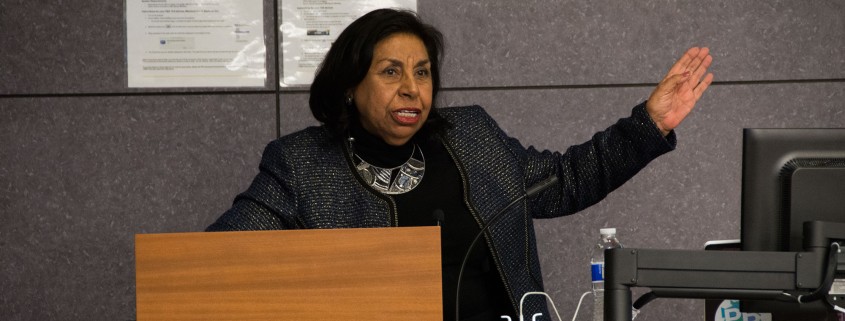Civil rights activist speaks to students
Civil rights activist Sylvia Mendez spoke at Taper Hall Monday evening about her family’s landmark Mendez v. Westminster case, which ended segregation in California in 1946.
As a young girl who grew up in Orange County, Mendez was forced to attend a school specifically for students of Mexican descent. After much dispute between her parents and the school, Mendez’s parents, Gonzalo and Felicitas Mendez, fought segregation by hiring a lawyer using income from the family’s agricultural business.
According to Mendez, Judge Paul J. McCormick ruled in favor of Mendez, which marked a defeat to the school districts in Orange County.
Mendez v. Westminster preceded Brown v. Board of Education and challenged racial segregation; it no doubt helped California become the first state to have integrated schools. For her continued efforts to combat racism, Mendez was awarded the Presidential Medal of Freedom, the highest citizen civilian award, by President Barack Obama in 2011.
“An Evening with Sylvia Mendez” was put together by the Political Student Assembly, EdMonth and the Latino Student Assembly. At the talk, Mendez played the Emmy-winning documentary Mendez v. Westminster: For all the Children/Para Todos los Niños to thoroughly explain her family’s efforts and then took questions afterward.
Mendez noted that we still see separation in schools today.
“We are more segregated now than we were in 1975,” Mendez said. “The two schools that are named after my mother and father … are 100 percent Latino … We can’t move out of a district. We can go to any school, but if we can’t move out of a district … we stay in that district and we’re segregated. They put the schools right in the middle of the barrio so all the Latinos go to that school.”
Director of Student Political Assembly Edwin Saucedo said we can’t see past efforts to desegregate communities as much as we should be able to.
“Even though we no longer get segregated based on the color of our skin, the communities that we build are very much segregated and they’re not as integrated as our ancestors have fought them to be,” Saucedo said.
If students stand up for change, others will be willing to help according to Mendez.
“When you find something you want to work for, you will see that everyone will want to join in for justice,” Mendez said. “People will rally. They’ll come and help you if you find an injustice and you stand up and fight.”
Mendez said students need to pave the way for equality.
“You students have a lot to work for,” Mendez said. “You have a struggle that’s ahead of you and you’re the ones that will have to find a solution.”
Saucedo said Mendez made him better recognize past efforts for equality.
“It kind of puts into perspective that the people that came before us really fought for us to be here and that’s something that we always need to keep in mind,” Saucedo said. “Going forward, we need to fight for other people to continue to have great opportunities.”
Stephanie Flores, a junior majoring in psychology, said spreading awareness is key to equality.
“Moving towards equality really starts within us and that’s just something that not everybody has caught on to sadly,” Flores said. “I think continuing to push and do what she does … is what creates the change. That’s where people find the will inside of them to move forward.”

